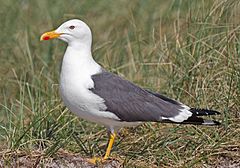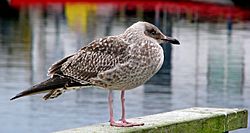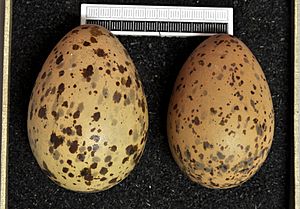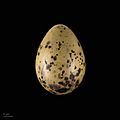Lesser black-backed gull facts for kids
Quick facts for kids Lesser black-backed gull |
|
|---|---|
 |
|
| Larus fuscus graellsii; England | |
| Conservation status | |
| Scientific classification | |
| Kingdom: | |
| Phylum: | |
| Class: | |
| Order: | |
| Family: | |
| Genus: |
Larus
|
| Binomial name | |
| Larus fuscus Linnaeus, 1758
|
|
The lesser black-backed gull (Larus fuscus) is a large gull that breeds on the Atlantic coasts of Europe. It is migratory, wintering from the British Isles south to West Africa. It is a regular winter visitor to the east coast of North America, probably from the breeding population in Iceland.
This species breeds in colonies on coasts and lakes. It makes a lined nest on the ground or a cliff. Normally, three eggs are laid. In some cities the species nests in towns and cities, often with herring gulls.
They are similar in size but slightly smaller than the herring gull. The taxonomy of the herring gull / lesser black-backed gull group is very complicated. Different authorities recognise between two and eight species. This group has a ring distribution around the northern hemisphere. Differences between adjacent forms in this ring are fairly small, but by the time the circuit is completed, the end members, herring gull and lesser black-backed gull, are clearly different species.
The only species it might be confused with in Europe is the great black-backed gull. Lesser is a smaller bird, with slimmer build, yellow rather than pinkish legs, and smaller white "mirrors" at the wing tips.
The bill is yellow with a red spot. When the young peck the red spot, The adults feed them by regurgitation. This is an inherited behaviour called a fixed action pattern or releaser.
Contents
Breeding
This species breeds colonially on coasts and lakes, making a lined nest on the ground or a cliff. Normally, three eggs are laid. In some cities the species nests within the urban environment, often in association with herring gulls.
Feeding
They are omnivores like most Larus gulls, and they will eat fish, insects, crustaceans, worms, starfish, molluscs, seeds, berries, small mammals, eggs, small birds, chicks, scraps, offal, and carrion.
Gallery
Images for kids
-
L. f. intermedius in flight, Sweden
-
Gull hatching eggs in Pälkäne, Finland
-
L. f. graellsii adult, Morocco
-
L. f. graellsii young adult, Morocco
See also
 In Spanish: Gaviota sombría para niños
In Spanish: Gaviota sombría para niños















